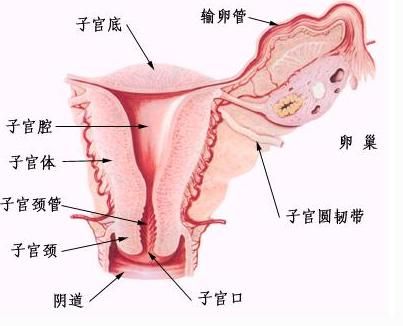A Sai (alias), in her 50s, began experiencing unexplained dizziness and abdominal bloating in March 2023. Usually in good health, she thought it was just indigestion and didn’t take it seriously. As the bloating worsened, she went to a local hospital, where it was discovered that her abdomen contained a large amount of fluid. The local hospital drained the fluid and detected cancer cells in the ascites, with a high possibility of originating from the ovaries.
How can simple bloating and indigestion lead to cancer? Ovarian cancer is often not detected early and is usually diagnosed in the late stages because the ovaries are deep in the pelvic cavity, making it hard for patients to notice any abnormalities. Most cases are only discovered when patients develop ascites and abdominal bloating, which often indicates a late stage. Therefore, if symptoms like bloating, abdominal pain, a feeling of fullness quickly after eating, constipation, or frequent urination persist for more than a few weeks and recur, it should be taken seriously. Even if it is a benign condition, it is a reminder to seek medical attention promptly.
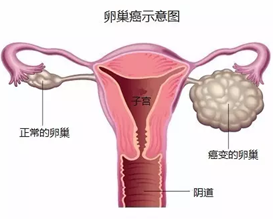
Due to the widespread distribution of A Sai's tumors and the large amount of fluid in her abdomen, the local hospital considered it impossible to perform satisfactory cytoreductive surgery. To seek further diagnosis and treatment, A Sai decided to go to a major hospital in Beijing, Shanghai, or Guangzhou. By chance, she learned that a fellow villager with ovarian cancer had been treated at Guangzhou Fuda Cancer Hospital with good results, so A Sai decided to seek treatment there.
Considering her medical history and current condition, Deputy Director Li Hongmei of the Sixth Medical Department at Fuda quickly organized a multidisciplinary consultation to formulate a personalized treatment plan for her:
Administer neoadjuvant chemotherapy to create conditions for surgery;
If the situation improves after chemotherapy, perform cytoreductive surgery to reduce the tumor burden;
Continue with maintenance treatment afterward.
Fortunately, after two courses of neoadjuvant chemotherapy, A Sai's ascites disappeared, her tumor marker CA125 significantly decreased, and her physical and mental state greatly improved, indicating that the chemotherapy was effective.
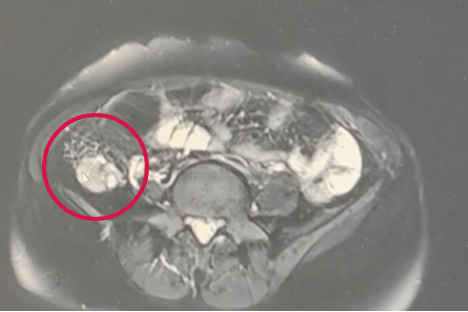
Pre-surgery image of A Sai after two courses of neoadjuvant chemotherapy
The next step was surgery. Given the extensive spread of A Sai's disease, with tumors near important organs like the intestines, bladder, and ureters, the surgery was very challenging. Under the surgical light, the medical team worked in perfect harmony, cautiously advancing with each step using an ultrasonic scalpel. In June 2023, using their exquisite surgical skills, the team successfully removed all visible tumor lesions from the surfaces of abdominal organs, achieving R0 resection standards. Postoperative pathology confirmed poorly differentiated serous adenocarcinoma of the right ovary with omental metastasis.
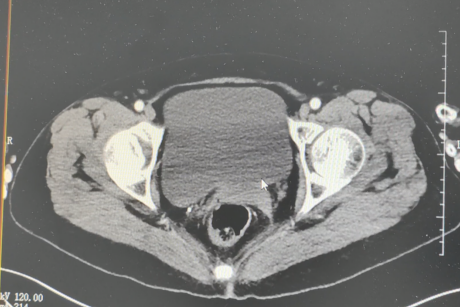
Post-surgery imaging diagnosis of A Sai
After surgery, A Sai regularly received chemotherapy and targeted therapy. As of June 2024, her follow-up results indicated no recurrence of the tumor.
Cervical Cancer Warning Signs
While A Sai’s condition was resolved, her family was very satisfied. In June 2023, A Sai’s younger sister, A Bao, accompanied her to the hospital for chemotherapy and took the opportunity to check her own stomach issues and have a routine gynecological examination. During the consultation, Deputy Director Li Hongmei noticed that A Bao had vaginal bleeding. Further examination revealed that her stomach issue was minor, but her uterus had significant problems.
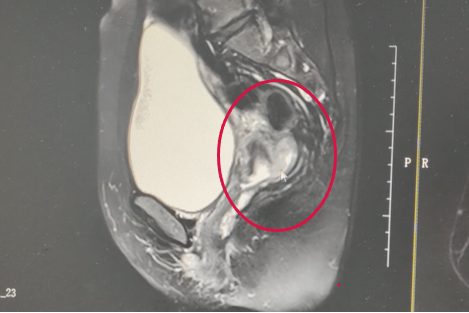
Pre-surgery imaging diagnosis of A Bao
A Bao’s cervical tumor was cauliflower-like with vaginal bleeding. Imaging suggested a possibility of cervical cancer. Biopsy results eventually confirmed moderately to poorly differentiated squamous cell carcinoma. Trusting Fuda Hospital and Deputy Director Li Hongmei, A Bao underwent an abdominal radical hysterectomy and pelvic lymphadenectomy in July 2023. Postoperative pathology confirmed poorly differentiated squamous cell carcinoma of the cervix, stage IB2. Based on the pathology results, A Bao received two additional courses of adjuvant chemotherapy. Her follow-up results showed good recovery with no signs of tumor recurrence.
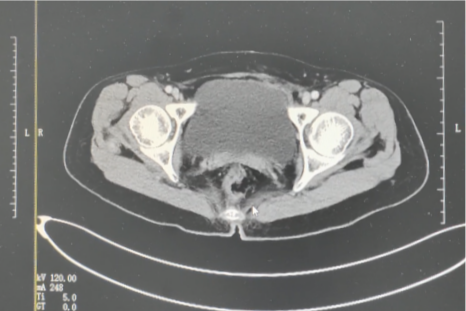
June 2024 follow-up imaging of A Bao
A Bao told us that having cancer is unfortunate, but they are lucky to have discovered it early and received treatment at Fuda Hospital. Previously, A Bao had intermittent vaginal bleeding, but she didn’t pay attention to it. If it wasn’t for her sister’s ovarian cancer alerting her to get a gynecological checkup, she might not have been diagnosed so early. Additionally, during the examination, it was found that A Bao was HPV positive. While HPV positivity doesn’t equate to cervical cancer, persistent high-risk HPV (such as HPV types 16 and 18) infection is a major cause of cervical cancer in women.
Deputy Director Li Hongmei reminds women to pay attention to their physical condition, have regular gynecological check-ups, and maintain a healthy lifestyle to prevent gynecological tumors. If women experience abdominal pain, bloating, vaginal bleeding, abdominal masses, or abnormal discharge, they should promptly visit a specialized hospital for early detection, diagnosis, and treatment. Additionally, Dr. Li recommends that women aged 9-45 get the HPV vaccine early to prevent cervical cancer.
